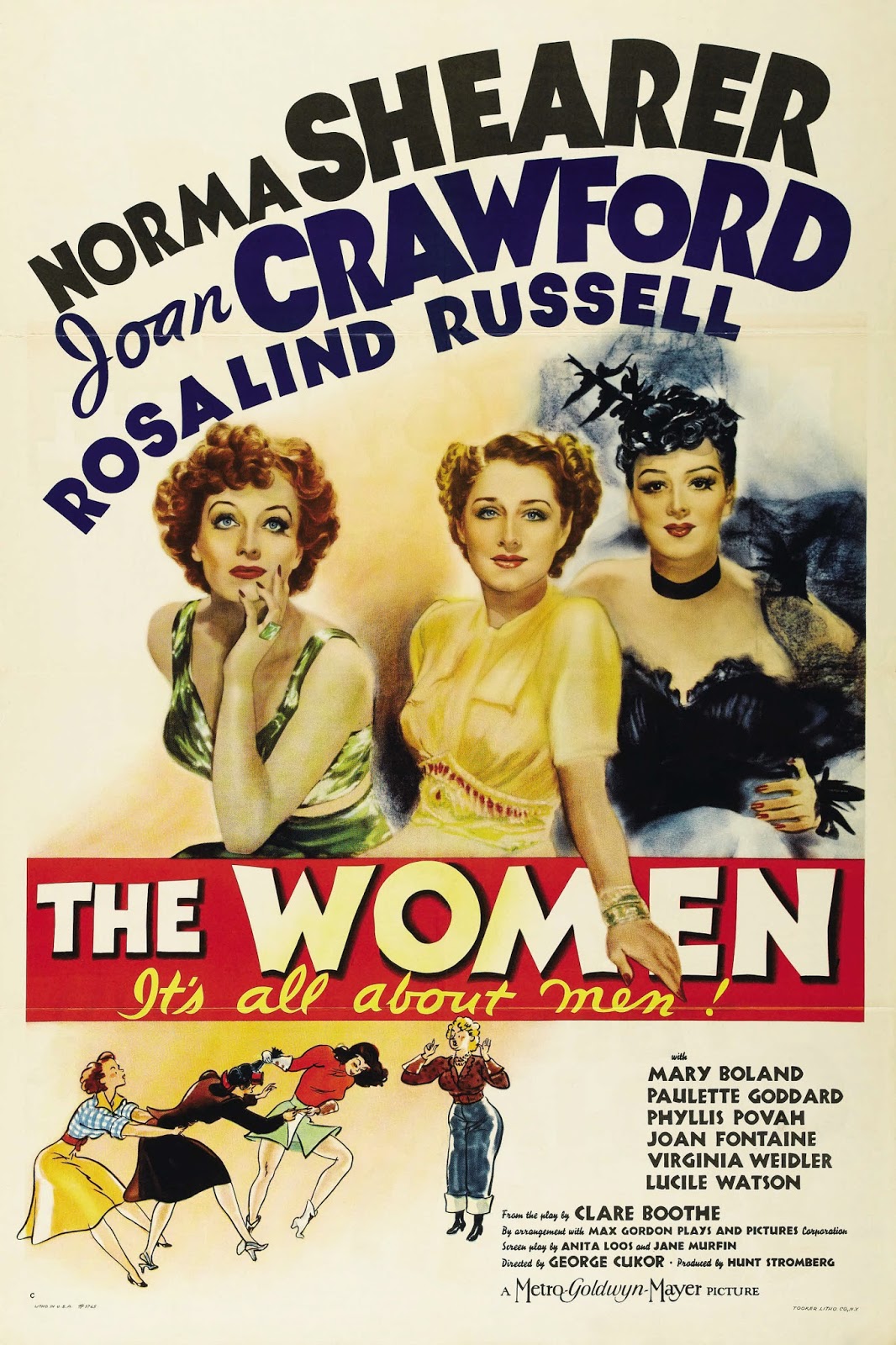Norma Shearer, Joan Crawford, Rosalind Russell
Directed by George Cukor
Based on the Broadway Play by Clare Boothe Luce
Screenplay by Anita Loos and Jane Murfin
Gossip is spreading and these park avenue ladies have their claws out. This is a story about wealthy women who find entertainment in spreading gossip to whomever will listen. The gossip is used for entertainment as well as for revenge.
George Cukor is one of my favorite directors. He often chose stories with strong and independent female characters (especially Katharine Hepburn in The Philadelphia Story and again in Adam’s Rib). The same is true for this film featuring an all-lady cast. Norma Shearer plays Mary, a happily married woman with a young daughter who shares the same name(played by Virginia Weidler, an extremely talented actress). Mary finds out, though the gossip of her friends, that her husband is cheating on her with a scheming perfume sales lady (Crystal, played by Crawford).
Now, don’t get me wrong. This movie is also full of imperfect people. Women who are bored, cat-like, dissatisfied, and searching for more. Even the sweet and naive leading lady uses manipulation in the end. The film is so hilarious because of the way that the women bite and scratch and claw like cats just to ruin each other’s lives. None of these women believe in “sisters before misters”. Here is the irony: they get angry when men cheat, but the women make it easier for the men to cheat! They find nothing wrong with louring married men and then bragging about their conquests to the wives. Case in point, Crystal says this to Mary:”Thanks for the tip. But when anything I wear doesn't please Stephen, I take it off”. I wish I could say that women don’t do this anymore, but sometimes it’s easier to complain about men then to do something to stop the problem.
I think what I appreciated most about this movie was the relationship between mother and daughter. In one particular scene, Mary has to tell little Mary that she and her father are getting a divorce. The emotion played by both of them was superb. It was heartbreaking to watch Weidler’s facial expressions change from a blissful ignorance to devastation.
I loved this film and it surpassed all of my expectations. It was facetious, witty, and went perfectly over the top with each character. I enjoyed seeing Virginia Weidler as she was even better than she was in Philadelphia Story. It’s nice to see a film in this time not only star a woman, but have every single character be a woman. This allows the screenwriter to avoid writing unimaginative housewives who are doormats for the male characters.
Wins:
1.Mary emphasized to little Mary that adults can fall out of love with each other, but that neither of them would stop loving her. Also, neither parent uses little Mary as a weapon. She is encouraged to treat her step-mother with respect and Mary never bashes her father’s character.
2. Mary tells her mother, “ It’s all right for you to talk of another generation, when women were chattels and did as men told them to, but this is today. Stephen and I are equals.” Huge moment for movies in the 1930’s.
3. Half-way through, it jumps from black and white to color during a fashion show. The color change is preceded by the line “a glimpse into the future”.
4. Little Mary has a solid relationship with both parents, is mature but still innocent as a child, and doesn’t resort to cattiness (even when baited by her stepmother).
5. The title sequence identifies each character with a picture of an animal:doe, tiger, cat, owl, monkey, fox, sheep, cow, and donkey.
1930’s messages:
- Women can be equals in a marriage.
- Even though women can be equals, they still lose their first name in a marriage (ex. Mrs. Stephen Haines).
- In this film, and in culture, men are written as thoughtless and insensitive (or just plain stupid). They are unable to make rational decisions or understand their own emotions. Women on the other hand, are more “sensible” (according to Mary’s mother). I know that it’s intended as irony that women are depicted as sensible when most of the women in the story are tearing each other apart but to me, it seems to hurt your case for feminism if you are also bashing the men just because they are men.
Quotes: Too many to list. Here are the big ones:
-Steven is tired of himself. Tired of feeling the same things in himself. Time comes when a man's got to feel something new. When he's got to feel young again just because he's growing old. We women are so much more sensible. When we tire of ourselves, we change the way we do our hair, or hire a new cook, or decorate the house. I suppose a man could do over his office, but he never thinks of anything so simple.
No, dear, a man has only one escape from his old self - to see a different self in the mirror of some woman's eyes.
-There's a name for you ladies, but it isn't used in high society, outside of a kennel.
- I made him pay for what he wanted... you made him pay for what he didn't want. 
